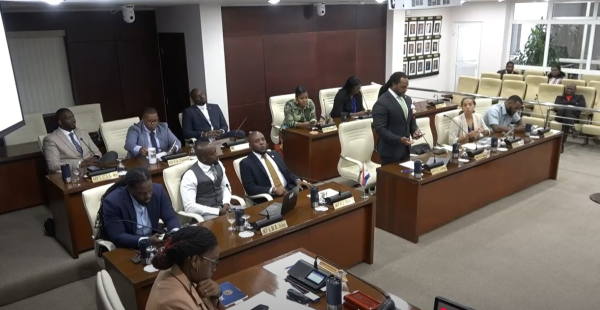 PHILIPSBURG:--- Today's question hour at the House of Parliament, meant to bring transparency to the Central Bank Chair appointment, instead highlighted the chamber’s chronic dysfunction—despite moments of pointed accountability from within the government’s own ranks. Coalition Members of Parliament Demar Labega and Sjamira Roseburg stood out with their incisive questioning, drilling into the Minister of Finance, Marinka Gumbs, over the legality and process of the controversial nomination. Yet, even as these coalition MPs pressed for answers, the proceedings were marred by procedural confusion, evasion, and an unruly disregard for established rules. The spectacle underscored just how far Parliament still has to go in upholding basic standards of oversight and governance.
PHILIPSBURG:--- Today's question hour at the House of Parliament, meant to bring transparency to the Central Bank Chair appointment, instead highlighted the chamber’s chronic dysfunction—despite moments of pointed accountability from within the government’s own ranks. Coalition Members of Parliament Demar Labega and Sjamira Roseburg stood out with their incisive questioning, drilling into the Minister of Finance, Marinka Gumbs, over the legality and process of the controversial nomination. Yet, even as these coalition MPs pressed for answers, the proceedings were marred by procedural confusion, evasion, and an unruly disregard for established rules. The spectacle underscored just how far Parliament still has to go in upholding basic standards of oversight and governance.
The meeting began with a semblance of order but quickly unraveled. The central issue was whether the Minister had followed the law in nominating a candidate for the CBCS chairmanship, specifically the requirement for a recommendation from the Supervisory Board. MP Adwell Irion posed direct questions, seeking to confirm whether the government had sidestepped this crucial step.
What followed was a masterclass in obfuscation. Minister Gumbs launched into a lengthy, defensive monologue, immediately requesting more time than the rules allowed. She argued that no appointment had been made, only a "conditional nomination," a piece of semantic gymnastics that failed to address the core of the issue: the legality of the nomination process itself. As her time elapsed with only one of five questions partially answered, the meeting spiraled. Cries of foul play from MPs, requests for adjournments, and arguments over the rules of order turned the chamber into a forum for bickering rather than oversight.
The performance of the Members of Parliament was hardly better. While some, like MP Irion, attempted to hold the Minister accountable, the collective effort was disjointed and ineffective. MPs seemed more interested in scoring political points and grandstanding than in methodically extracting the truth. The session became a free-for-all, with members interrupting, points of order being misused, and a general disregard for the very procedures meant to ensure a productive debate. The Chairman's struggle to maintain control only highlighted the chamber's lack of discipline.
Throughout the session, substantive answers remained elusive. The Minister repeatedly deflected direct questions about her authority to initiate a search for a candidate without the Board's recommendation. Her explanation of a search conducted by "like-minded persons" and "professionals in this field" was alarmingly vague, raising more questions than it answered. Who were these individuals? Who commissioned them? Why was this parallel process deemed acceptable when a legal framework already existed? The refusal to provide these details, even confidentially, suggests a profound lack of transparency.
This entire episode is more than just a political squabble; it is a serious indictment of the government's approach to good governance. The independence and integrity of the Central Bank are paramount to the stability of our monetary union. The process for appointing its leadership is not a set of optional guidelines to be circumvented when inconvenient. Yet, the Minister's actions, and the Parliament's inability to effectively challenge them, suggest a dangerous belief that political will can override established legal protocol.
The public was not served by this question hour. They were treated to a chaotic display that undermined faith in their elected officials and their commitment to the rule of law. Instead of clarity, we were left with more confusion and a troubling sense that when it comes to matters of great importance, procedure is merely a suggestion. This is not governance; it is mismanagement on public display.